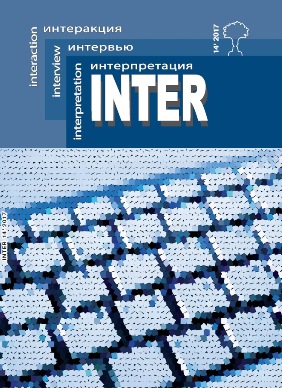«Русские» ИТ-специалисты и их профессиональная мобильность за рубежом
Для цитирования
Земнухова Л. В. «Русские» ИТ-специалисты и их профессиональная мобильность за рубежом // Интеракция. Интервью. Интерпретация. 2017. Том 9. № 14. С. 5-15. (in English).
Аннотация
В статье рассматриваются профессиональные траектории ИТ-специалистов в (пост)советском мире, которые возникли в результате сочетания формальных структур и неформальных практик. В то время как государство инициировало и продвигало систему повсеместного образования, включающую внеклассные активности, сообщество учителей, ученых, инженеров использовало инфраструктурные возможности для воспитания нового поколения будущих ИТ-специалистов. Характер российской ИТ-подготовки основан на образовании, но не исчерпывается им. Успех «русских технарей» в мире также в значительной степени зависел от социально-экономических трансформаций в постсоветских странах. «Русские» ИТ-специалисты сталкивались с трудностями и вызовами, которые необходимо было преодолевать. Их профессиональные траектории формировались в условиях ощутимых изменений экономической ситуации, а их уникальный опыт способствовал развитию мобильности, которая стала средством достижения заметных результатов в ИТ-мире. Исследование основано на материалах биографических интервью с «русскими» ИТ-профессионалами, живущими и работающими в Лондоне.
Ключевые слова:
информационные технологии, профессиональная миграция, мобильность, инженерная культура, советское образование,
Литература
Abella M. Global competition for skilled workers and consequences // Competing for global talent. Geneva: International Labour Organization, 2006. P. 11–32.
Aneesh A. Virtual Migration: the Programming of Globalization. Duke: University Press, 2006.
Beine M., Docquier F., Rapoport H. Brain Drain and LDCs’ Growth: Winners and Losers. 2003.
Biao X. Global ‘Body Shopping’. An Indian Labour System in the Information Technology Industry. Princeton, NI: Princeton University Press, 2007.
Boeri T., Brücker H. eds. Migrants, Brain Drain and Brain Gain: The Global Competition to Attract High-Skilled. Oxford University Press, 2012.
Carr S. C., Inkson K., Thorn K. From global careers to talent flow: Reinterpreting ‘brain drain’ // Journal of World Business. Iss. 40. 2005. P. 386–398.
Clemens M. A. Skill Flow: A Fundamental Reconsideration of Skilled-Worker Mobility and Development. New York: UNDP, 2009.
Coleman G. E. Coding Freedom: The Ethics and Aesthetics of Hacking. Princeton, 2012.
Drori I. The Evolution of a New Industry: A Genealogical Approach. Stanford: Stanford University Press, 2013.
Kenney M. ed. Understanding Silicon Valley: The Anatomy of an Entrepreneurial Region. Stanford: Stanford University Press, 2000.
Kunda G. Engineering culture: control and commitment in a high-tech corporation. Philadelphia: Temple University Press, 1992.
Kuznetsov Y., Sabel C. International Migration of Talent, Diaspora Networks, and Development: Overview of Main Issues // Diaspora Networks and the International Migration of Skills: How Countries Can Draw on Their Talent Abroad. World Bank. 2006.
Lovell S., Ledeneva A., Rogachevskiῐ A. eds. Bribery and Blat in Russia: Negotiating Reciprocity From the Middle Ages to the 1990s. St. Martin’s Press, University of London, 2000.
Osipian A. Corrupt Organizational Hierarchies in the Former Soviet Bloc // Transition Studies Review. 2010. 17(4). P. 822–836.
Raymond E. SThe Cathedral and the Bazaar: Musings on Linux and Open Source by an Accidental Revolutionary. O’Reilly Media, 1999.
Saxenian A. Regional Advantage: Culture and Competition in Silicon Valley and Route 128. Cambridge, MA: Harvard University Press, 1994.
Solimano A. The International Mobility of Talent: Types, Causes, and Development Impact. Oxford and New York: Oxford University Press, 2008.
Takhteyev Y. Coding Places: Software Practice in a South American City. Cambridge, Mass.: MIT Press, 2012.
Weinberg G. M. The Psychology of Computer Programming. s.l.: Van Nostrand Reinhold, 1971.
Zemnukhova L. Highly skilled Russian migrants in London: the case of IT professionals // Urban studies and practices. Moscow: National Research University HSE. 2017. 2(1). P. 54–63.
Aneesh A. Virtual Migration: the Programming of Globalization. Duke: University Press, 2006.
Beine M., Docquier F., Rapoport H. Brain Drain and LDCs’ Growth: Winners and Losers. 2003.
Biao X. Global ‘Body Shopping’. An Indian Labour System in the Information Technology Industry. Princeton, NI: Princeton University Press, 2007.
Boeri T., Brücker H. eds. Migrants, Brain Drain and Brain Gain: The Global Competition to Attract High-Skilled. Oxford University Press, 2012.
Carr S. C., Inkson K., Thorn K. From global careers to talent flow: Reinterpreting ‘brain drain’ // Journal of World Business. Iss. 40. 2005. P. 386–398.
Clemens M. A. Skill Flow: A Fundamental Reconsideration of Skilled-Worker Mobility and Development. New York: UNDP, 2009.
Coleman G. E. Coding Freedom: The Ethics and Aesthetics of Hacking. Princeton, 2012.
Drori I. The Evolution of a New Industry: A Genealogical Approach. Stanford: Stanford University Press, 2013.
Kenney M. ed. Understanding Silicon Valley: The Anatomy of an Entrepreneurial Region. Stanford: Stanford University Press, 2000.
Kunda G. Engineering culture: control and commitment in a high-tech corporation. Philadelphia: Temple University Press, 1992.
Kuznetsov Y., Sabel C. International Migration of Talent, Diaspora Networks, and Development: Overview of Main Issues // Diaspora Networks and the International Migration of Skills: How Countries Can Draw on Their Talent Abroad. World Bank. 2006.
Lovell S., Ledeneva A., Rogachevskiῐ A. eds. Bribery and Blat in Russia: Negotiating Reciprocity From the Middle Ages to the 1990s. St. Martin’s Press, University of London, 2000.
Osipian A. Corrupt Organizational Hierarchies in the Former Soviet Bloc // Transition Studies Review. 2010. 17(4). P. 822–836.
Raymond E. SThe Cathedral and the Bazaar: Musings on Linux and Open Source by an Accidental Revolutionary. O’Reilly Media, 1999.
Saxenian A. Regional Advantage: Culture and Competition in Silicon Valley and Route 128. Cambridge, MA: Harvard University Press, 1994.
Solimano A. The International Mobility of Talent: Types, Causes, and Development Impact. Oxford and New York: Oxford University Press, 2008.
Takhteyev Y. Coding Places: Software Practice in a South American City. Cambridge, Mass.: MIT Press, 2012.
Weinberg G. M. The Psychology of Computer Programming. s.l.: Van Nostrand Reinhold, 1971.
Zemnukhova L. Highly skilled Russian migrants in London: the case of IT professionals // Urban studies and practices. Moscow: National Research University HSE. 2017. 2(1). P. 54–63.
Форматы цитирования
Другие форматы цитирования:
APA
Земнухова, Л. В. (2017). «Русские» ИТ-специалисты и их профессиональная мобильность за рубежом. Интеракция. Интервью. Интерпретация, 9(14), 5-15. извлечено от https://www.inter-fnisc.ru/index.php/inter/article/view/5504
Выпуск
Раздел
Исследовательские дискурсы: профессиональный труд, занятость, этнография











